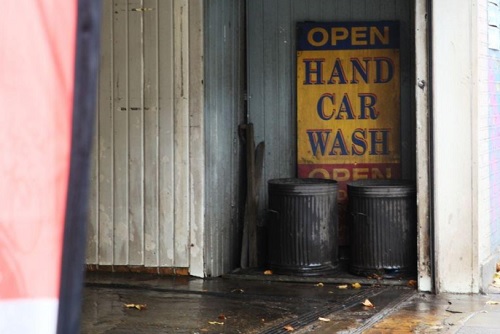LONDON (Thomson Reuters Foundation) - Tricked into washing cars in London for 12 hours a day without pay and treated like a slave, Bogdan quit after a week - hoping to find a better job after his move to Britain from Romania.
His hopes were short-lived. That night, three men visited the room he had rented from the car wash owners and ordered him to open a string of bank accounts using fake identity documents.

A sign for a hand car wash in east London, England, October 28, 2017. THOMSON REUTERS FOUNDATION / Kieran Guilbert.
“They raised their voices, and were aggressive,” the 31-year-old told the Thomson Reuters Foundation, declining to give his real name out of fear of retribution by his enslavers.
“I was very scared, and emotional, so I accepted it.”
Thousands of workers in hand car washes across Britain are believed to be modern slaves - mostly men lured from Eastern European countries such as Albania and Bulgaria with promises of paid work, housing and better job opportunities in the future.
Yet many end up trapped in debt bondage, forced to live and work in squalid and unsafe conditions, stripped of their documents and subjected to threats, abuse and violence.
Some slaves, such as Bogdan, are coerced to commit crimes - afraid for their lives and for their families if they refuse.
At least 13,000 people across the country are estimated by the government to be living in modern slavery but police say that the true figure is likely to be in the tens of thousands.
While forced labor is rife among Britain’s building sites, nail bars, factories and farms, car wash slavery is rocketing with unregulated sites sprouting up rapidly nationwide, according to the country’s anti-slavery agency and chief.
Police are ramping up investigations but say the crime is tough to crack with 20,000 car washes believed to be flouting laws, most victims too scared to speak out, and the increasingly cash-squeezed British public hunting for ever cheaper services.
“This is modern slavery on an industrial scale,” said Lysbeth Ford of the Gangmasters and Labour Abuse Authority (GLAA), Britain’s anti-slavery body. “The government and the police are not yet aware of the extent of car wash slavery”.
“It has exploded because workers are being underpaid or not paid at all - creating an environment ripe for exploitation.”
In several London car washes visited by the Thomson Reuters Foundation, many employees were not wearing protective clothing while most were unwilling to talk about their pay or living conditions, and pointed to their bosses when questioned further.
While such workers are in plain sight - not hidden away like slaves in brothels, houses, and cannabis farms - their fear and reluctance to speak out makes it difficult to identify and help victims, said global anti-trafficking charity Hope for Justice.
“When you visit a car wash and ask workers about their situation, they parrot the same rehearsed line about being paid the minimum wage and not working more than 40 hours each week,” said Lauren Batty, who works for the group in northern England.
When police suspect slavery at a car wash, they seek out all possible intelligence - from analysis of its finances to covert surveillance - before raiding a site in the hope of persuading workers to come forward, or securing a victimless prosecution.
Leave Comments